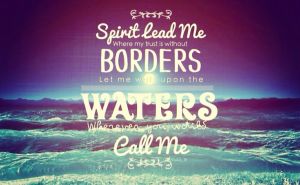This week has been an exercise in trust, and I honestly don’t know if I can say that I’ve done all that well.
Most people who know me would probably agree if I asserted that my thought life was pretty active. Sometimes that’s a good thing. I tend to think through things very thoroughly and methodically.
Sometimes it’s a bad thing. It’s easy for me to imagine every single possible unfortunate eventuality of every situation. It’s easy for me to worry about the worst case scenario—and dwell on it endlessly. The problem with this is that I’m simply not trusting God.
I guess my fear, then, is that God won’t take care of me, that he will let something bad happen. Of course, the most frightening thing is that with this comes the realization that, yes, God does allow bad things to happen. Really bad things. Death, illness, poverty, simple misfortune.
However, as a Christian, I am also promised eternal safety. I will never be alone, never forsaken, and I think the general human experience leads us to believe the opposite: When there occur death, illness, poverty, simple misfortune, the only logical answer is that we have been forsaken, that we have been forgotten. That’s human thinking. But God is not necessarily that kind of protector. (At this point, I feel it necessary to add that, yes, God does also save us from all of these things at certain times, but there is an allowance for suffering still.)
Reading Ecclesiastes 7 this morning and contemplating all of this, there were a few verses that caught my attention:
Consider the work of God:
who can make straight what he has made crooked?(Ecclesiastes 7:13 ESV)
All this I have tested by wisdom. I said, “I will be wise,” but it was far from me. That which has been is far off, and deep, very deep; who can find it out?
(Ecclesiastes 7:23-24 ESV)
I had no idea what these meant. The rest of the passage seems straightforward: a comparison between wisdom and folly. But these were strange, out of place. I ended up using a commentary to look them up, and I think that there was a much needed answer in what I found:
Verse 13 asserts that there are things that God has made crooked, things that we as humans cannot make straight. What does that mean, though? The verse isn’t quite saying the usual “humans can’t interfere with God’s sovereign plan”; instead, it seems to be saying that humans cannot make right what God has made, for lack of a better word, wrong. That is, if God chooses to put suffering or hardship in our lives, we can no more change it than we could change any of his other plans—so why bother trying? Why bother worrying? Why not just be just as content in adversity as in prosperity? (Good lesson for me to learn #1)
In verses 23, Solomon laments the incompleteness of his wisdom—he just can’t always make the wisest decision, it seems. He can’t always be right. Verse 24 was what confused me. What is “that which has been far off and deep”? Other versions translate the verse as: “far off and most profound” (NIV), “remote and exceedingly mysterious” (NASB), or “far off and exceeding deep” (KJV).
Again, the commentary came in handy. Perhaps this is a reference to God, to his plans, to what mysteries he has put into the earth. In other words, how can we hope to fully understand God? Much of human experience tells us that what can’t be understood (or even be hoped to be understood) is useless to try to understand at all or, worse, a waste of time.
As I was looking at these two verses together, I suddenly realized: Bad things will happen to me (my life may be made crooked), I may not understand them (their mystery will be far off), and I will be powerless to do anything in their midst (I cannot make them straight). It’s kind of a terrifying thought at first, but it is undeniably the Christian experience.
How am I living in light of that realization? Am I living in fear (I most certainly am, at times)? How should I live instead?
This song has really been heavy on my heart lately, and I think it echoes some of the thoughts I’ve had today:


One comment